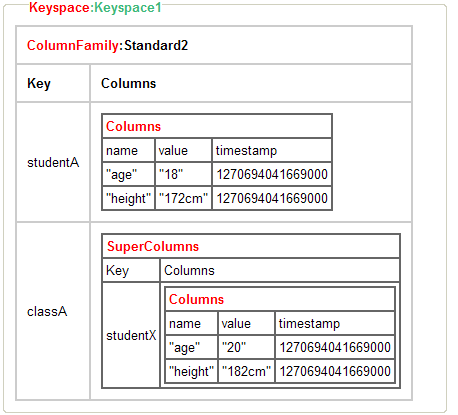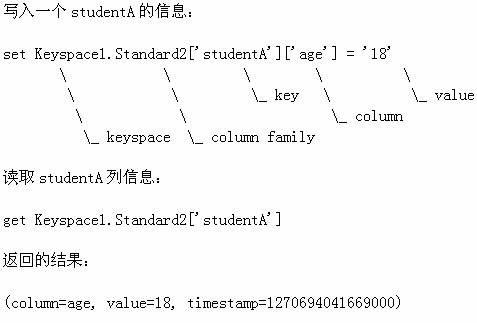首页 > 代码库 > 分布式 Key-Value 存储系统:Cassandra 入门
分布式 Key-Value 存储系统:Cassandra 入门
Cassandra 的数据存储结构
Cassandra 的数据模型是基于列族(Column Family)的四维或五维模型。它借鉴了 Amazon 的 Dynamo 和 Google‘s BigTable 的数据结构和功能特点,采用 Memtable 和 SSTable 的方式进行存储。在 Cassandra 写入数据之前,需要先记录日志 ( CommitLog ),然后数据开始写入到 Column Family 对应的 Memtable 中,Memtable 是一种按照 key 排序数据的内存结构,在满足一定条件时,再把 Memtable 的数据批量的刷新到磁盘上,存储为 SSTable 。
图 1. Cassandra 的数据模型图:
-

- Cassandra 的数据模型的基本概念:
- 1. Cluster : Cassandra 的节点实例,它可以包含多个 Keyspace
2. Keyspace : 用于存放 ColumnFamily 的容器,相当于关系数据库中的 Schema 或 database3. ColumnFamily : 用于存放 Column 的容器,类似关系数据库中的 table 的概念 4. SuperColumn :它是一个特列殊的 Column, 它的 Value 值可以包函多个 Column5. Columns:Cassandra 的最基本单位。由 name , value , timestamp 组成
下面是关于数据模型实例分析 :
图 2. 数据模型实例分析

回页首
Cassandra 节点的安装和配置
获取 Cassandra
# wget http://labs.renren.com/apache-mirror/cassandra/0.6.0/apache- cassandra-0.6.0-rc1-bin.tar.gz # tar -zxvf apache-cassandra-0.6.0-rc1-bin.tar.gz # mv apache-cassandra-0.6.0-rc1 cassandra # ls Cassandra
Cassandra 的目录说明
| bin | 存放与 Cassandra 操作的相关脚本 |
|---|---|
| conf | 存放配置文件的目录 |
| interface | Cassandra 的 Thrift 接口定义文件,可以用于生成各种编程语言的接口代码 |
| Javadoc | 源代码的 javadoc |
| lib | Cassandra 运行时所需的 jar 包 |
配制 Cassandra 节点的数据存储目录和日志目录
修改配制文件 storage-conf.xml:
默认的内容
<CommitLogDirectory>/var/lib/cassandra/commitlog</CommitLogDirectory> <DataFileDirectories> <DataFileDirectory>/var/lib/cassandra/data</DataFileDirectory> </DataFileDirectories>
配置后的内容
<CommitLogDirectory>/data3/db/lib/cassandra/commitlog</CommitLogDirectory> <DataFileDirectories> <DataFileDirectory>/data3/db/lib/cassandra/data</DataFileDirectory> </DataFileDirectories>
修改日志配制文件 log4j.properties:
log4j.properties 配置
# 日志路径 #log4j.appender.R.File=/var/log/cassandra/system.log # 配置后的日志路径 : log4j.appender.R.File=/data3/db/log/cassandra/system.log
创建文件存放数据和日志的目录
# mkdir – p /data3/db/lib/cassandra # mkdir – p /data3/db/log/Cassandra
配制完成后,启动 Cassandra
# bin/Cassandra
显示信息
INFO 09:29:12,888 Starting up server gossip INFO 09:29:12,992 Binding thrift service to localhost/127.0.0.1:9160
看到这两行启动回显信息时,说明 Cassandra 已启动成功。
连接到 Cassandra 并添加、获取数据
Cassandra 的 bin 目录已自带了命令行连接工具 cassandra-cli,可使用它连接到 Cassandra,并添加、读取数据。
连接到 Cassandra,并添加、读取数据
# bin/cassandra-cli --host localhost --port 9160 Connected to: "Test Cluster" on localhost/9160 Welcome to cassandra CLI. Type ‘help‘ or ‘?‘ for help. Type ‘quit‘ or ‘exit‘ to quit. cassandra> cassandra> set Keyspace1.Standard2[‘studentA‘][‘age‘] = ‘18‘ Value inserted cassandra> get Keyspace1.Standard2[‘studentA‘] => (column=age, value=http://www.mamicode.com/18, timestamp=1272357045192000) >
停止 Cassandra 服务
查出 Cassandra 的 pid:16328
# ps -ef | grep cassandra # kill 16328
Cassandra 配制文件 storage-conf.xml 相关配制介绍
清单 1. storage-conf.xml 节点配制说明清单
<!-- 集群时显示的节点名称 -->
<ClusterName>Test Cluster</ClusterName>
<!-- 节点启动时,是否自动加入到集群中,默认为 false -->
<AutoBootstrap>false</AutoBootstrap>
<!-- 集群的节点配制 -->
<Seeds>
<Seed>127.0.0.1</Seed>
</Seeds>
<!-- 节点之间通迅的监听地址 -->
<ListenAddress>localhost</ListenAddress>
<!--
基于 Thrift 的 cassandra 客户端监听地址,
集群时设为:0.0.0.0 表示侦听所有客户端 , 默认为:localhost
-->
<ThriftAddress>localhost</ThriftAddress>
<!-- 客户端连接的端口 -->
<ThriftPort>9160</ThriftPort>
<!--
FlushDataBufferSizeInMB 将 memtables 上的数据写入在 Disk 上,
超过设定好的限制大小时 ( 默认 32M),则将数据写入磁盘,
FlushIndexBufferSizeInMB 超过设定的时长(默认 8 分钟)后,
将 memtables 由的数据写入磁盘中
-->
<FlushDataBufferSizeInMB>32</FlushDataBufferSizeInMB>
<FlushIndexBufferSizeInMB>8</FlushIndexBufferSizeInMB>
<!--
节点之间的日志记录同步模式。
默认:periodic, 对应配制 CommitLogSyncPeriodInMS
启动 batch 时,则对应的配制 CommitLogSyncBatchWindowInMS
-->
<CommitLogSync>periodic</CommitLogSync>
<!-- 默认为每 10 秒同步一次日志记录 -->
<CommitLogSyncPeriodInMS>10000</CommitLogSyncPeriodInMS>
<!--
<CommitLogSyncBatchWindowInMS>1</CommitLogSyncBatchWindowInMS> -->
回页首
常用编程语言使用 Cassandra 来存储数据
在使用 Cassandra 时,通常情况下都需要使用第三方插件 Thrift 来生成与 Cassandra 相关的库文件 , 您可以在 http://incubator.apache.org/thrift 下载此插件,并学习它的使用方法。以下是分别在 Java、PHP、Python、C#、Ruby 五种常用编程语言中使用 Cassandra:
Java 程序使用 Cassandra
把 libthrift-r917130.jar,apache-cassandra-0.6.0-rc1.jar 加入到 Eclipse 的编译路径中。
建立数据库连接:使用 libthrift-r917130.jar 的 TTransport 的 open 方法建立起与 Cassandra 服务端 (IP:192.168.10.2 端口:9160) 的连接。
数据库操作:使用 Cassandra.Client 创建一个客户端实例。调用 Client 实例的 insert 方法写入数据,通过 get 方法获取数据。
关闭数据库连接:使用 TTransport 的 close 方法断开与 Cassandra 服务端的连接。
清单 2. Java 连接 Cassandra,写入并读取数据。
package com.test.cassandra;|
import java.io.UnsupportedEncodingException;
import org.apache.thrift.transport.TTransport;
import org.apache.thrift.transport.TSocket;
import org.apache.thrift.protocol.TProtocol;
import org.apache.thrift.protocol.TBinaryProtocol;
import org.apache.thrift.TException;
import org.apache.cassandra.thrift.Cassandra;
import org.apache.cassandra.thrift.Column;
import org.apache.cassandra.thrift.ColumnOrSuperColumn;
import org.apache.cassandra.thrift.ColumnPath;
import org.apache.cassandra.thrift.ConsistencyLevel;
import org.apache.cassandra.thrift.InvalidRequestException;
import org.apache.cassandra.thrift.NotFoundException;
import org.apache.cassandra.thrift.TimedOutException;
import org.apache.cassandra.thrift.UnavailableException;
/*
* 使 Java 客户端连接 Cassandra 并进行读写操作
* @author jimmy
* @date 2010-04-10
*/
public class JCassandraClient{
public static void main(String[] args) throws InvalidRequestException,
NotFoundException, UnavailableException, TimedOutException,
TException, UnsupportedEncodingException {
// 建立数据库连接
TTransport tr = new TSocket("192.168.10.2", 9160);
TProtocol proto = new TBinaryProtocol(tr);
Cassandra.Client client = new Cassandra.Client(proto);
tr.open();
String keyspace = "Keyspace1";
String cf = "Standard2";
String key = "studentA";
// 插入数据
long timestamp = System.currentTimeMillis();
ColumnPath path = new ColumnPath(cf);
path.setColumn("age".getBytes("UTF-8"));
client.insert(keyspace,key,path,"18".getBytes("UTF-8"),
timestamp,ConsistencyLevel.ONE);
path.setColumn("height".getBytes("UTF-8"));
client.insert(keyspace,key,path,"172cm".getBytes("UTF-8"),
timestamp,ConsistencyLevel.ONE);
// 读取数据
path.setColumn("height".getBytes("UTF-8"));
ColumnOrSuperColumn cc = client.get(keyspace, key, path, ConsistencyLevel.ONE);
Column c = cc.getColumn();
String v = new String(c.value, "UTF-8");
// 关闭数据库连接
tr.close();
}
}
PHP 程序使用 Cassandra
在 PHP 代码中使用 Cassandra,需要借助 Thrift 来生成需要的 PHP 文件,通过使用 thrift --gen php interface/cassandra.thrift 生成所需要的 PHP 文件,生成的 PHP 文件中提供了与 Cassandra 建立连接、读写数据时所需要的函数。
清单 3. PHP 连接 Cassandra,写入并读取数据。
<?php
$GLOBALS[‘THRIFT_ROOT‘] = ‘/usr/share/php/Thrift‘;
require_once
$GLOBALS[‘THRIFT_ROOT‘].‘/packages/cassandra/Cassandra.php‘;
require_once
$GLOBALS[‘THRIFT_ROOT‘].‘/packages/cassandra/cassandra_types.php‘;
require_once $GLOBALS[‘THRIFT_ROOT‘].‘/transport/TSocket.php‘;
require_once $GLOBALS[‘THRIFT_ROOT‘].‘/protocol/TBinaryProtocol.php‘;
require_once
$GLOBALS[‘THRIFT_ROOT‘].‘/transport/TFramedTransport.php‘;
require_once
$GLOBALS[‘THRIFT_ROOT‘].‘/transport/TBufferedTransport.php‘;
try {
// 建立 Cassandra 连接
$socket = new TSocket(‘192.168.10.2‘, 9160);
$transport = new TBufferedTransport($socket, 1024, 1024);
$protocol = new TBinaryProtocolAccelerated($transport);
$client = new CassandraClient($protocol);
$transport->open();
$keyspace = ‘Keyspace1‘;
$keyUser = "studentA";
$columnPath = new cassandra_ColumnPath();
$columnPath->column_family = ‘Standard1‘;
$columnPath->super_column = null;
$columnPath->column = ‘age‘;
$consistency_level = cassandra_ConsistencyLevel::ZERO;
$timestamp = time();
$value = http://www.mamicode.com/"18"; >
Python 程序使用 Cassandra
在 Python 中使用 Cassandra 需要 Thrift 来生成第三方 Python 库,生成方式: thrift --gen py interface/cassandra.thrift, 然后在 Python 代码中引入所需的 Python 库,生成的 Python 库提供了与 Cassandra 建立连接、读写数据时所需要的方法。
清单 4. Python 连接 Cassandra,写入并读取数据。
from thrift import Thrift
from thrift.transport import TTransport
from thrift.transport import TSocket
from thrift.protocol.TBinaryProtocol import
TBinaryProtocolAccelerated
from cassandra import Cassandra
from cassandra.ttypes import *
import time
import pprint
def main():
socket = TSocket.TSocket("192.168.10.2", 9160)
transport = TTransport.TBufferedTransport(socket)
protocol = TBinaryProtocol.TBinaryProtocolAccelerated(transport)
client = Cassandra.Client(protocol)
pp = pprint.PrettyPrinter(indent=2)
keyspace = "Keyspace1"
column_path = ColumnPath(column_family="Standard1", column="age")
key = "studentA"
value = http://www.mamicode.com/"18 ">
C# 使用 Cassandra
在 C# 中使用 Cassandra 需要 Thrift.exe 来生成动态链接库,使用 ./thrift.exe --gen csharp interface/cassandra.thrift 生成所需要的 DLL 文件,生成的 DLL 提供了与 Cassandra 建立连接,读写数据等所需的类和方法,在编程环境中引入生成的 DLL,即可使用。
清单 5. C# 连接 Cassandra,写入并读取数据。
namespace CshareCassandra{
using System;
using System.Collections.Generic;
using System.Diagnostics;
using Apache.Cassandra;
using Thrift.Protocol;
using Thrift.Transport;
class CassandraClient{
static void Main(string[] args){
// 建立数据库连接
TTransport transport = new TSocket("192.168.10.2", 9160);
TProtocol protocol = new TBinaryProtocol(transport);
Cassandra.Client client = new Cassandra.Client(protocol);
transport.Open();
System.Text.Encoding utf8Encoding = System.Text.Encoding.UTF8;
long timeStamp = DateTime.Now.Millisecond;
ColumnPath nameColumnPath = new ColumnPath(){
Column_family = "Standard1",
Column = utf8Encoding.GetBytes("age")};
// 写入数据
client.insert("Keyspace1","studentA",nameColumnPath,
utf8Encoding.GetBytes("18"),timeStamp, ConsistencyLevel.ONE);
// 读取数据
ColumnOrSuperColumn returnedColumn = client.get("Keyspace1",
"studentA", nameColumnPath, ConsistencyLevel.ONE);
Console.WriteLine("Keyspace1/Standard1: age: {0}, value: {1}",
utf8Encoding.GetString(returnedColumn.Column.Name),
utf8Encoding.GetString(returnedColumn.Column.Value));
// 关闭连接
transport.Close();
}
}}
Ruby 使用 Cassandra
在 Ruby 中使用 Cassandra 需要先安装 gem,安装命令:gem install cassandra
安装完成后,打开 Ruby 的 irb 开始使用 Cassandra。
清单 6. Ruby 连接 Cassandra,写入并读取数据
> require ‘rubygems‘
> require ‘cassandra‘
# 建立数据库连接
> cdb = Cassandra.new(‘Keyspace1‘,"192.168.10.1:9160", :retries => 3)
# 写入数据
> cdb.insert(:Standard1, ‘studentA‘, {‘age‘ => ‘18‘})
# 读取数据
> cdb.get(:Standard1, :studentA)
# 关闭连接
> cdb.disconnect
回页首
搭建 Cassandra 集群环境
Cassandra 的集群是没有中心节点的,各个节点的地位完全相同,节点之间是通过 gossip 的协议来维护集群的状态。
以下是两台安装了 Linux 系统的服务器,且初步设置了 Cassandra 环境和启用了端口 7000,9160:
| 服务器名 | 端口 | IP 地址 |
|---|---|---|
| ServiceA | 7000,9160 | 192.168.10.3 |
| ServiceB | 7000,9160 | 192.168.10.2 |
配制服务器 ServiceA、ServiceB 的 storage-conf.xml 文件
ServiceA 的配置
<Seeds> <Seed>192.168.10.3</Seed> </Seeds> <ListenAddress>192.168.10.2</ListenAddress> <ThriftAddress>0.0.0.0</ThriftAddress>
ServiceB 的配置
<Seeds> <Seed>192.168.10.3</Seed> <Seed>192.168.10.2</Seed> </Seeds> <ListenAddress>192.168.10.2</ListenAddress> <ThriftAddress>0.0.0.0</ThriftAddress>
配制完成后,分别启动 ServiceA 和 ServiceB 上的 Cassandra 服务。
查看 ServiceA 和 ServiceB 是否集群成功,可使用 Cassandra 自带的客户端命令
bin/nodetool --host 192.168.10.2 ring
集群成功则会返回以下类似信息:
Address Status Load Range Ring
106218876142754404016344802054916108445
192.168.10.2 Up 2.55 KB 31730917190839729088079827277059909532 |<--|
192.168.10.3 Up 3.26 KB 106218876142754404016344802054916108445 |-->|
使用 Cassandra 命令行工具进行集群测试
从 ServiceB 连接到 ServiceA,可使用命令:
cassandra-cli -host 192.168.10.3 -port 9160
集群测试一
写入集群数据 ServiceA 连接到 ServiceA: # set Keyspace1.Standard2[‘studentAA‘][‘A2A‘] = ‘a2a‘ ServiceB 连接到 ServiceA: # set Keyspace1.Standard2[‘studentBA‘][‘B2A‘] = ‘b2a‘ ServiceA 连接到 ServiceB: # set Keyspace1.Standard2[‘studentAB‘][‘A2B‘] = ‘a2b‘
获取集群数据:
ServiceA 连接到 ServiceA :
# get Keyspace1.Standard2[‘studentAA‘],
get Keyspace1.Standard2[‘studentBA‘],
get Keyspace1.Standard2[‘studentAB‘]
ServiceB 连接到 ServiceA :
# get Keyspace1.Standard2[‘studentAA‘],
get Keyspace1.Standard2[‘studentBA‘],
get Keyspace1.Standard2[‘studentAB‘]
ServiceA 连接到 ServiceB :
# get Keyspace1.Standard2[‘studentAA‘],
get Keyspace1.Standard2[‘studentBA‘],
get Keyspace1.Standard2[‘studentAB‘]
清单 8. 集群测试清单二
ServiceA 停止 Cassandra 服务,ServiceA 连接到 ServiceB 并写入数据
# set Keyspace1.Standard2[‘studentAR‘][‘A2R‘] = ‘a2R‘
启动 ServiceA,并链接到 ServiceA 本身,读取刚才在 ServiceB 写入的数据
# bin/cassandra-cli -host 192.168.10.3 -port 9160 # get Keyspace1.Standard2[‘studentAR‘]
回页首
总结
以上我们介绍了 Cassandra 的数据模型、节点安装和配置、常用编程语言中使用 Cassandra 以及 Cassandra 的集群和测试。Cassandra 是一个高性能的 P2P 去中心化的非关系型数据库,可以分布式进行读写操作。在系统运行时可以随意的添加或删降字段,是 SNS 应用的理想数据库。
